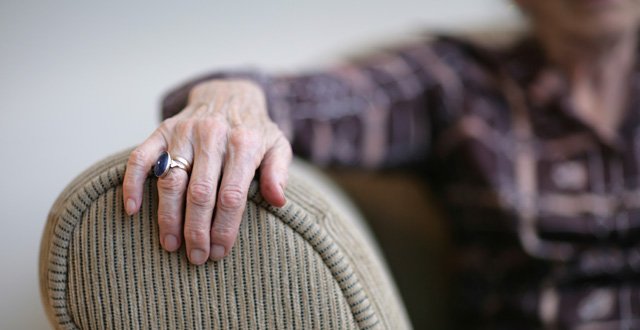The morbidity and mortality faced by older people during the current pandemic is leading to significant policy and clinical questioning. David Lynch spoke to experts about the issue
The new Government, when it is finally established, should appoint a dedicated Minister for Older People with “cross-departmental and societal reach”, the President of the Irish Gerontological Society (IGS) Dr Diarmuid O’Shea has told the Medical Independent (MI).
At the time of writing, deaths among nursing home residents are generating major controversy. As of midnight Tuesday 21 April, the Health Protection Surveillance Centre had been informed of 302 clusters in residential care settings, 179 of which are in nursing homes. Of the 769 deaths in laboratory confirmed cases, almost half (348) are associated with nursing home settings. It is likely the true number of Covid-19-related deaths in the sector is higher.
Dr O’Shea, Consultant Geriatrician at St Vincent’s University Hospital, Dublin, told this newspaper that the Covid-19 pandemic is one “of many reasons” why the new Government should appoint a specific Minister for Older People separate from the Department of Health.
Dr O’Shea was one of a number of gerontologists contacted by this newspaper in April to talk about the policy and clinical implications of the current pandemic on older citizens.
Vulnerabilities
“This pandemic has highlighted the vulnerabilities within the field, particularly in relation to the situation within nursing homes,” Prof Rose-Anne Kenny, Principal Investigator at The Irish Longitudinal Study on Ageing (TILDA), Trinity College Dublin, told MI.
“It has highlighted how the system can come under pressure in nursing homes — the addition of acutely ill patients, staff reduction pressures, all impacting on the provision of care.”

Prof Kenny said the lessons learned during this current crisis will also be important for the coming years. “This virus will, unfortunately, not be the last,” she warned, “and this situation could well happen again in the future due to the nature of these pandemics.
“It demonstrates the need for a joined-up and accelerated approach when trying to manage pandemics like this in homes and institutions.”
Dr O’Shea told MI that the need for a focus on clinical governance has become clear during the present pandemic.
“We need to see properly regulated and mandated clinical governance that reflects the needs of these complex older people and patients, both living in the community and nursing homes,” said Dr O’Shea.
“This should include a much more formalised public system of medical care into public, private and voluntary care settings.
“This sector will also require a lot more staff that receive ongoing continuous training and education updates. The format of the National Frailty Education programme — driven by the [HSE] Older Persons Programme, the Office of Nursing and Midwifery and The Irish Longitudinal Study in Ageing — is one example of this type of work.
“The senior nursing roles, designated medical officer and regional clinical director roles with the expertise required to support this all need to be factored into this discussion, as do the roles of the general practitioners.”
Governance
Dr O’Shea believes that changes to the nursing home sector will need to be made.
“There also needs to be a properly resourced, publicly-funded system of care put in place to support this. As the CEO of the HSE, Paul Reid, was quoted as saying: ‘We need to wrap our arms around the private nursing home sector’.
“But in addition to that, we must recognise that most of the people living in these nursing and residential care facilities are already funded by NTPF [National Treatment Purchase Fund] and are GMS patients; they should already be entitled to this,” Dr O’Shea told MI.
“There is, however, a funding and governance piece that needs to be put in place to support them properly and the current challenges that the healthcare sector are meeting and facing is shining a light on this for us all.”
However, the President of the IGS is hopeful that some positives may emerge from the crisis.

“One of the great legacies to come out of this may well be how we can harness and coalesce the community goodwill we have seen come together at this time,” said Dr O’Shea.
“From local councils, An Post, An Garda, Age Friendly Ireland, ALONE, individuals, along with the healthcare professionals, have pulled together to help support, shield and care for the range of fit, vibrant older people, to those that are at risk and more vulnerable.
“How we build, galvanise and sustain this in the years ahead is a real challenge.”
Dedicated minister
“This is one of the many reasons also why our new Government should appoint a dedicated Minister for Older People,” continued Dr O’Shea.
“I think this should be a separate ministry [from the Department of Health]; however, it is more important that it is not a shared position. I think, given how our population demographics are growing in the next 10-to-20 years, the diversity of areas older people in our society will be impacting on include finances, economics, social, health, transport, education — pigeon-holing this ministry as a subsection of one department doesn’t make sense to me.
“It should be a department of its own and we should plan for the future.”
The HSE also has a vital part to play, according to Dr O’Shea.
“The central role played by the Older Person’s Clinical Programme in the HSE, led by Dr Siobhan Kennelly, will be key, but it will be in association with many other groups,” said Dr O’Shea.
“As to what the Older Person’s Clinical Programme in the HSE could do right now… [it can] keep advocating as they are and harnessing all the diverse groups, including healthcare professionals, who are contributing to the response we are seeing.
“One of the lasting legacies of this pandemic may well be that Ireland finally wakes up to the collective responsibility we have to show how we value older people in our country.”
Gerontology
In terms of how gerontology as a branch of medicine will be impacted, Prof Thomas Scharf, Professor of Social Gerontology, Population Health Sciences Institute, Sir James Spence Institute, Newcastle University, UK, said “the impacts of Covid-19 on older people and the field of gerontology are obviously incredibly powerful”.
Looking at the UK experience, Prof Scharf added, “of particular concern is the lack of adequate protection for frontline staff and for informal carers of older people who develop coronavirus symptoms”.
“Increasingly, we are also anxious about the way in which people in long-term care settings are being denied access to medical care.”
Ms Mo Flynn is a gerontologist and former President of the IGS from 2014 until 2017. She told MI that “hopefully it [Covid-19 pandemic] will help to highlight the significant risk of the current models of long-term care and the growing numbers of large-scale nursing homes into which we herd so many older people.
“It will emphasise the need to accelerate the development of primary care and community responses and services for older people to enable them to continue living in their own homes.”
In terms of the current response to Covid-19, Ms Flynn said: “[The] key source of policy response to tackle Covid-19 has been focus on chronological age versus physiological age. Really, [the response] should focus on the risks for all people with underlying conditions.
“[The] blanket focus on chronological age is not helpful and ignores considerable risk for younger people and may well encourage riskier behaviour by younger people. Significant levels of illness and death among healthcare workers and ICU admissions are in those under 70.”
Ms Flynn added that “for the many people who survive the acute Covid-19 illness, the critical need will be for rehabilitation subsequently.
“Undoubtedly, the key skills in gerontology will be required and the absence of appropriate rehabilitation facilities will come to the fore. Indeed, as more people return to the community, the lack of community therapy staff like OTs [occupational therapists], physios, may well hinder recovery’,” she told MI.
“Given the high vulnerability of nursing homes to Covid-19, it would be entirely inappropriate to use them as step-down facilities when discharging patients from acute hospitals… there is a need to designate additional services to either support these people to return home or to utilise hotel spaces to provide convalescence beds and use primary and community care teams to support this.”
‘Ageist’
Ms Flynn said that the pandemic had confirmed “the vulnerability of older people living in nursing and residential homes”.
“The development model of large-scale nursing homes with 100-plus beds, staffed by low-paid carers with limited protective equipment and limited training in infection prevention and control, will inevitably come into question as we move on from this crisis.
“Inconsistent access to medical and nursing care, community therapy services and particularly ‘gerontologically-focused’ care is common across our nursing home sector and will need to be addressed.”
The former President of the IGS added that she was concerned over the use of ‘ageist’ language during the crisis and the wider impact of loneliness.
She said there were “deeply ageist comments, such as ‘deaths of older people are collateral damage’, [and] the promotion of the ideology that older people should be willing to sacrifice their lives for the economic wellbeing of the younger generation run the risk of influencing policy decisions on the treatment and delivery of healthcare to older people and lead to many more deaths”.
Pointing to some examples in the UK and the US of the use of such language by opinion-writers and politicians, Ms Flynn said “thankfully, we have not heard this publicly in Ireland to date, but we need to be aware as the cold wind of recession creeps in that this thinking could become more prevalent.”
She added that the “impact of loneliness and isolation on mental health, particularly on older people [is] coming to prominence [and is] actually a serious health issue that Dr Brian Lawlor, Dr Rose-Anne Kenny and organisations such as Alone and Age Action have been highlighting for years.”
Need for formal Government guidance on vitamin D
There needs to be a formal Government policy or recommendation on vitamin D, Dr Eamon Laird, Research Fellow in Medical Gerontology in Trinity College Dublin (TCD), told this newspaper.
In April, researchers from The Irish Longitudinal Study on Ageing (TILDA) at TCD released a report titled Vitamin D deficiency in Ireland — Implications for Covid-19: Results from the Irish Longitudinal Study on Ageing (TILDA).

The report found that vitamin D plays a critical role in preventing respiratory infections, reducing antibiotic use, and boosting the immune system’s response to infections.
Importantly, the report also found that 27 per cent of Irish adults over 70 who are ‘cocooning’ are estimated to be deficient in vitamin D.
Asked whether awareness of the impact of vitamin D deficiency had increased since the publication of the report, co-author Dr Laird said: “Yes, I think there is at least an increased recognition of the importance of vitamin D, both for older adults and the wider population.
“I’m not sure if people realised the full extent of the degree of deficiency in the older population group.
“I think increased awareness among health professionals, nurses and nursing home staff would help this issue. This could be through educating staff, highlighting new research, or reminding staff of current recommendations and needs.”
On the need for a formal policy recommendation or policy, Dr Laird told MI: “At the moment we don’t really have a formal vitamin D policy for the population.
“We do not have mandatory vitamin D food fortification — this only occurs on a voluntary basis by some food manufacturers. It is a pity, as such a programme has been shown to be successful in decreasing deficiency rates.
“For instance, Finland has a mandatory policy and has virtually eliminated vitamin D deficiency from its population (<1% deficient), despite being at a further latitude than Ireland and receiving less UVB radiation needed for vitamin D synthesis.
“We particular need a policy for our at-risk older adults and those in nursing homes, where the vitamin D policy should be a choice to ‘opt-out’ rather than the choice to ‘opt in’.
“Of additional importance is our ethnic minority groups (ie, Asian-Irish is the largest ethnic minority group in Ireland, at nearly 2 per cent of population who are at a particular increased risk of vitamin D deficiency and from international studies, increased risk of Covid-19.
“Any recommendations need to come from the collaboration of our key stakeholders: The Food Safety Authority of Ireland, the HSE, Department of Health, and the Department of Finance also, all in consultation with food manufacturers and the researchers in the field.”













Leave a Reply
You must be logged in to post a comment.